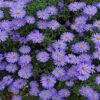**The Relaxing Effects of Chrysanthemums: Nature’s Tranquilizers**

Chrysanthemums, with their delicate petals and soothing aroma, have been cherished for centuries for their remarkable ability to promote relaxation and calmness. In the realm of herbal remedies and traditional medicine, chrysanthemums are revered for their therapeutic properties that help alleviate stress, reduce anxiety, and induce a sense of tranquility. This exploration of the relaxing effects of chrysanthemums delves into their botanical profile, medicinal benefits, and cultural significance as natural tranquilizers.
**1. Botanical Profile and Active Compounds**
Chrysanthemums belong to the Asteraceae family and encompass a diverse range of species and cultivars known for their ornamental and medicinal qualities. The most commonly used species in herbal medicine is Chrysanthemum morifolium, distinguished by its large, daisy-like flowers and aromatic foliage. Chrysanthemum flowers contain essential oils, flavonoids (such as luteolin and apigenin), and other bioactive compounds that contribute to their relaxing effects.
The essential oils extracted from chrysanthemum flowers are prized for their calming properties, which are attributed to their ability to modulate neurotransmitters in the brain associated with relaxation and mood regulation. Flavonoids found in chrysanthemums possess antioxidant and anti-inflammatory properties, supporting overall wellness and contributing to the flower’s stress-relieving benefits.
**2. Stress Relief and Anxiety Reduction**
Chrysanthemums have long been used as natural remedies for stress relief and anxiety reduction in traditional medicine systems worldwide. In Chinese herbalism (TCM), chrysanthemum tea is consumed to soothe the liver, clear heat, and calm the mind. The gentle, cooling nature of chrysanthemums is believed to harmonize the body’s energy (qi) and relieve tension accumulated from daily stressors.
Chrysanthemum tea is often recommended for individuals experiencing nervousness, irritability, or insomnia due to its gentle sedative effects. The floral aroma of chrysanthemums has a calming influence on the nervous system, helping to promote relaxation and improve sleep quality. Regular consumption of chrysanthemum tea is considered a holistic approach to stress management and emotional well-being in herbal traditions.
**3. Anti-Inflammatory and Muscle Relaxation**
Chrysanthemums possess anti-inflammatory properties that contribute to their muscle-relaxing effects and pain-relieving benefits. In traditional medicine, chrysanthemum extracts are used topically to soothe sore muscles, reduce joint inflammation, and alleviate headaches. The cooling properties of chrysanthemums help alleviate tension-related discomfort and promote physical relaxation.
Chrysanthemum poultices and compresses are applied to areas of tension or inflammation to promote circulation and ease muscular stiffness. The analgesic properties of chrysanthemums make them valuable components of herbal liniments and topical preparations used for pain relief and relaxation. By addressing physical discomfort, chrysanthemums contribute to overall relaxation and well-being.
**4. Respiratory Support and Lung Health**
Chrysanthemums are beneficial for respiratory support and lung health, particularly in addressing symptoms of allergies, asthma, and respiratory congestion. Chrysanthemum tea is traditionally used to clear phlegm, reduce coughing, and soothe irritated airways. The natural expectorant properties of chrysanthemums help alleviate respiratory discomfort and promote easier breathing.
In traditional herbal formulations, chrysanthemums are combined with other lung-supporting herbs to enhance their therapeutic effects. Chrysanthemum-infused steam inhalations are used to open the airways and relieve nasal congestion. The respiratory benefits of chrysanthemums contribute to their overall calming effects on the body and mind.
**5. Cultural Significance and Ritual Practices**
Chrysanthemums hold profound cultural significance as symbols of relaxation, serenity, and renewal. In East Asian cultures, chrysanthemums are associated with autumn and are celebrated in seasonal festivals dedicated to nature’s beauty and bounty. Chrysanthemum tea ceremonies are conducted to honor the flower’s calming influence and promote mindful relaxation.
In traditional herbalism, chrysanthemums are integrated into rituals and daily practices aimed at promoting balance and harmony within the body. The ritualistic preparation and consumption of chrysanthemum tea embody a holistic approach to well-being that emphasizes the interconnectedness of physical, emotional, and spiritual health.
**6. Modern Applications and Wellness Practices**
Modern wellness practices embrace the relaxing effects of chrysanthemums through herbal teas, aromatherapy, and botanical supplements. Chrysanthemum tea is enjoyed as a daily tonic for stress relief and emotional balance. Chrysanthemum essential oil is diffused or applied topically to promote relaxation and create a tranquil atmosphere.
Chrysanthemum-based products, such as herbal tinctures and bath additives, are incorporated into self-care routines to enhance relaxation and support overall wellness. Integrative practitioners recommend chrysanthemum supplements as natural alternatives to promote relaxation and reduce symptoms of anxiety and tension.
**Conclusion**
Chrysanthemums are nature’s tranquilizers, offering a gentle and effective way to promote relaxation, reduce stress, and enhance overall well-being. From their botanical profile to their cultural significance, chrysanthemums embody centuries of herbal wisdom and holistic healing traditions. By embracing the relaxing effects of chrysanthemums, we tap into nature’s innate ability to restore balance and harmony within the body and mind. Incorporating chrysanthemums into daily wellness practices fosters a deeper connection to nature and promotes holistic approaches to stress management and emotional resilience.
**Harnessing the Relaxing Effects of Chrysanthemums: A Holistic Approach to Well-Being**
Chrysanthemums, renowned for their beauty and therapeutic properties, offer a multifaceted approach to relaxation and well-being. Beyond their ornamental appeal, chrysanthemums have a profound impact on mental and physical health, making them valuable allies in the pursuit of relaxation and stress reduction. This exploration of the relaxing effects of chrysanthemums delves deeper into their holistic applications, therapeutic benefits, and cultural significance as botanical agents of tranquility.
**1. Herbal Infusions and Calming Rituals**
Chrysanthemum tea stands out as one of the most popular and accessible ways to experience the relaxing effects of these flowers. Brewed from dried chrysanthemum petals, this floral infusion is celebrated for its delicate flavor and therapeutic qualities. The act of preparing and sipping chrysanthemum tea is itself a calming ritual, inviting mindfulness and a moment of respite from the demands of daily life.
Chrysanthemum tea is often enjoyed before bedtime to promote relaxation and improve sleep quality. The natural compounds in chrysanthemums, such as apigenin and luteolin, interact with neurotransmitters in the brain to induce a sense of tranquility and reduce anxiety. Regular consumption of chrysanthemum tea is part of a holistic approach to stress management and emotional well-being in herbal traditions.
**2. Aromatherapy and Ambient Relaxation**
Chrysanthemum essential oil is prized for its aromatic profile and therapeutic benefits in aromatherapy. The floral fragrance of chrysanthemum oil has a calming effect on the nervous system, helping to reduce stress and promote relaxation. Diffusing chrysanthemum oil in the home or workplace creates an ambient atmosphere that supports mental clarity and emotional balance.
Chrysanthemum oil can also be diluted and applied topically to pulse points or added to bathwater for a soothing sensory experience. The inhalation of chrysanthemum oil vapor stimulates the limbic system, triggering a relaxation response and alleviating tension. Incorporating chrysanthemum oil into daily rituals enhances overall well-being and fosters a sense of serenity in the midst of modern life’s pressures.
**3. Stress Reduction and Emotional Resilience**
Chrysanthemums contribute to stress reduction and emotional resilience through their adaptogenic properties. Adaptogens are natural substances that help the body cope with stress and restore balance to the adrenal glands. Chrysanthemums support the body’s stress response system, helping to regulate cortisol levels and mitigate the effects of chronic stress.
Regular consumption of chrysanthemum tea or exposure to chrysanthemum oil can enhance the body’s ability to adapt to stressors and promote emotional stability. The calming effects of chrysanthemums contribute to a greater sense of emotional resilience and inner calm, empowering individuals to navigate life’s challenges with grace and composure.
**4. Sleep Support and Relaxing Bedtime Rituals**
Chrysanthemums are valued for their sleep-promoting properties and role in establishing relaxing bedtime rituals. Drinking chrysanthemum tea before bedtime helps calm the mind and prepare the body for restful sleep. The gentle sedative effects of chrysanthemums promote deep relaxation and reduce sleep disturbances.
In traditional medicine, chrysanthemum tea is often combined with other calming herbs, such as lavender or chamomile, to enhance its sleep-inducing effects. Creating a soothing bedtime routine that includes chrysanthemum tea or aromatherapy with chrysanthemum oil signals to the body that it’s time to unwind and transition into a restful state.
**5. Cultural Traditions and Mindful Practices**
Chrysanthemums are deeply rooted in cultural traditions that celebrate relaxation, mindfulness, and the art of living well. In East Asian cultures, chrysanthemum tea ceremonies are conducted with reverence and attention to detail, embodying the principles of harmony and balance. The practice of serving chrysanthemum tea fosters social connection and promotes a sense of community.
In Western cultures, chrysanthemums are embraced for their universal appeal as symbols of relaxation and renewal. Incorporating chrysanthemums into daily rituals, such as morning meditation or afternoon tea breaks, encourages mindfulness and cultivates a deeper appreciation for the present moment. By honoring cultural traditions that elevate relaxation, chrysanthemums become ambassadors of well-being in diverse global contexts.
**6. Integrative Wellness and Holistic Health**
The relaxing effects of chrysanthemums are embraced in integrative wellness practices that prioritize holistic health and self-care. Chrysanthemum-based supplements, herbal formulations, and skincare products offer innovative ways to incorporate these flowers into daily routines. Integrative practitioners recommend chrysanthemums as natural alternatives for managing stress, supporting emotional balance, and promoting overall vitality.
By integrating chrysanthemums into holistic health protocols, individuals can tap into nature’s wisdom and nurture a deeper connection with themselves and the world around them. The versatile applications of chrysanthemums in herbal remedies, aromatherapy, and mindful practices underscore their role as botanical allies in the quest for relaxation and well-being.
**Conclusion**
Chrysanthemums embody the essence of relaxation and tranquility, offering a holistic approach to well-being that extends beyond their ornamental beauty. From herbal infusions to aromatherapy rituals, chrysanthemums inspire mindful practices that support stress reduction, emotional resilience, and restorative sleep. By harnessing the relaxing effects of chrysanthemums, individuals can cultivate a deeper sense of balance and harmony in their lives, embracing nature’s gifts for optimal health and vitality.

